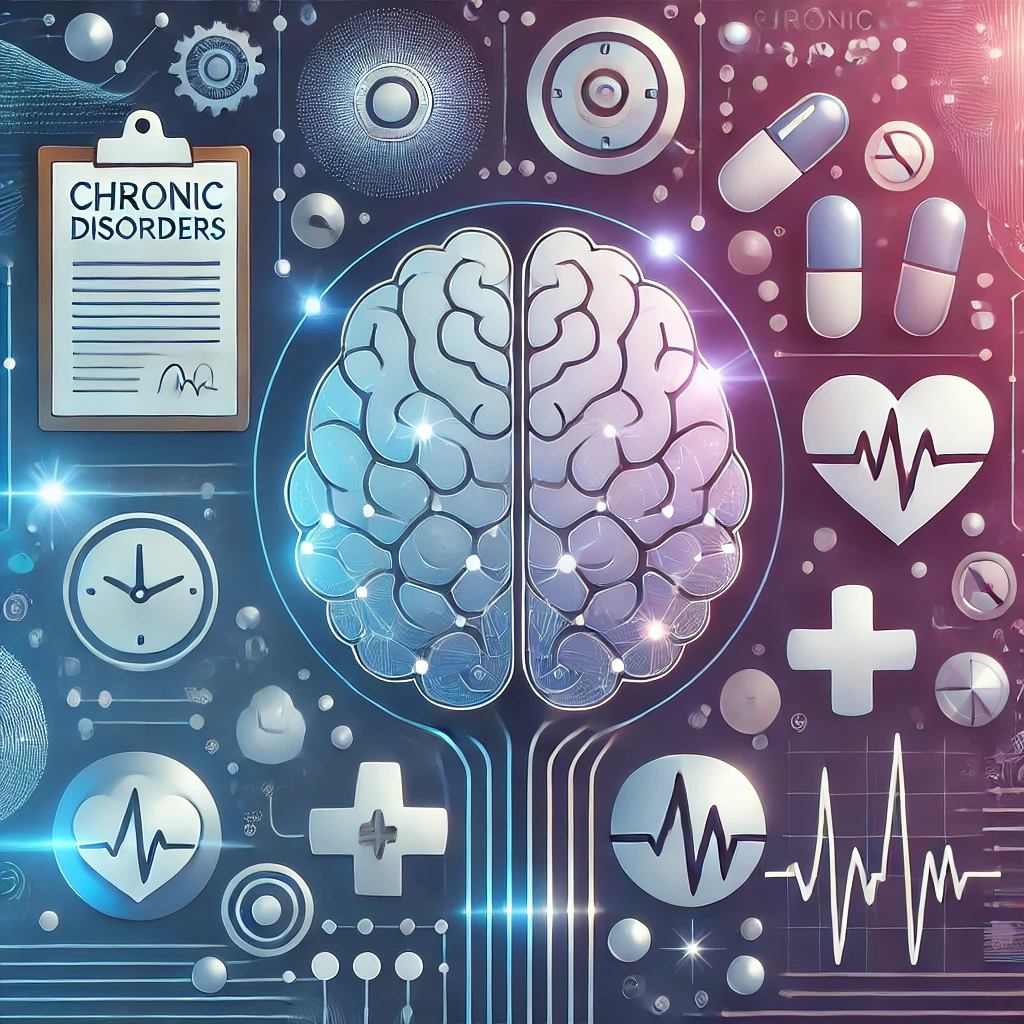Our Services
- Diabetes Mellitus
- Hypertension
- Osteoporosis
- Inflammatory Bowel Diseases
- Hypothyroidism and Endocrine Diseases
- Chronic Respiratory Diseases
- Chronic Neurological Diseases
- Chronic Liver Diseases
- Chronic Kidney Diseases
- Cardiovascular Diseases
- Arthritis and Rheumatic Diseases
- Confidential STD Testing & Treatment
- Women’s Health Screenings
- Men’s Health Screenings
- Obesity
- Vitamin Infusions
- Weight Management

Chronic Mental Disorders
Chronic mental disorders are long-term conditions that affect mood, cognition, and behavior, significantly impacting daily life and overall well-being. Common conditions include depression, bipolar disorder, schizophrenia, and generalized anxiety disorder (GAD).
At our clinic, we offer a holistic treatment approach, combining pharmacological therapies, psychological counseling, and continuous follow-ups to improve the patient’s quality of life and long-term mental health.
Types of Chronic Mental Disorders
1. Depression (Major Depressive Disorder – MDD)
- A persistent mood disorder causing feelings of sadness, hopelessness, and loss of interest.
- Symptoms: Fatigue, sleep disturbances, appetite changes, difficulty concentrating.
- Treatment: Antidepressant medications, psychotherapy, lifestyle changes.
2. Bipolar Disorder
- A condition characterized by extreme mood swings between depression and mania.
- Types:
- Bipolar I: Severe manic episodes with depressive phases.
- Bipolar II: Hypomanic episodes with major depression.
- Treatment: Mood stabilizers, psychotherapy, lifestyle adjustments.
3. Schizophrenia
- A severe mental disorder affecting thinking, perception, and emotional response.
- Symptoms: Hallucinations, delusions, disorganized speech, social withdrawal.
- Treatment: Antipsychotic medications, cognitive behavioral therapy (CBT), structured support systems.
4. Generalized Anxiety Disorder (GAD)
- A chronic condition causing excessive worry and anxiety that interferes with daily life.
- Symptoms: Restlessness, muscle tension, rapid heartbeat, excessive fears.
- Treatment: Anti-anxiety medications, relaxation techniques, therapy.
5. Other Common Chronic Mental Health Conditions
- Obsessive-Compulsive Disorder (OCD): Repetitive behaviors and intrusive thoughts.
- Post-Traumatic Stress Disorder (PTSD): Anxiety following trauma exposure.
- Personality Disorders: Long-term patterns of behavior that affect relationships and functioning.
Symptoms of Chronic Mental Disorders
Symptoms vary based on the condition but may include:
- Persistent sadness or mood swings.
- Excessive worry or irrational fears.
- Difficulty concentrating or memory issues.
- Sleep disturbances (insomnia or excessive sleeping).
- Social withdrawal & lack of motivation.
- Hallucinations, paranoia, or disorganized thoughts.
Mental Health Management & Treatment
1. Psychological Evaluations & Diagnosis
- Comprehensive mental health screenings to assess symptoms.
- Psychiatric evaluations to determine medication needs.
- Cognitive & behavioral assessments for treatment planning.
2. Pharmacological Therapies
- Antidepressants (SSRIs, SNRIs, MAOIs) for depression & anxiety.
- Mood stabilizers (Lithium, anticonvulsants) for bipolar disorder.
- Antipsychotic medications for schizophrenia & psychotic disorders.
- Anxiolytics to help manage acute anxiety symptoms.
3. Psychological Counseling & Therapy
- Cognitive Behavioral Therapy (CBT): Helps patients reframe negative thought patterns.
- Dialectical Behavior Therapy (DBT): Effective for emotional regulation & personality disorders.
- Exposure Therapy: Used for PTSD and OCD.
- Group & family therapy: Provides support and guidance.
4. Lifestyle & Wellness Strategies
- Regular exercise & relaxation techniques to manage stress.
- Mindfulness & meditation practices to enhance mental clarity.
- Balanced diet & adequate sleep to support brain function.
5. Long-Term Support & Monitoring
- Regular psychiatric follow-ups for medication adjustments.
- Crisis intervention services for severe episodes.
- Community support programs for social reintegration.
Complications of Untreated Mental Disorders
Without proper management, chronic mental disorders can lead to:
- Severe functional impairment & job loss.
- Increased risk of substance abuse.
- Self-harm or suicidal thoughts.
- Social isolation & strained relationships.
- Physical health decline due to stress-related illnesses.
Advantage Mental Health Care
We provide a comprehensive mental health management program, including:
✅ Accurate diagnosis & individualized treatment plans.
✅ Medication management for symptom stabilization.
✅ Psychological therapy tailored to each condition.
✅ Crisis intervention & 24/7 support for severe cases.
✅ Guidance for caregivers & family members.


Health Tips & Info
- Prioritize self-care by maintaining a balanced routine.
- Stay socially connected to avoid isolation.
- Engage in therapy or support groups for ongoing encouragement.
- Monitor symptoms and seek help if they worsen.
- Adhere to prescribed treatments for long-term stability.